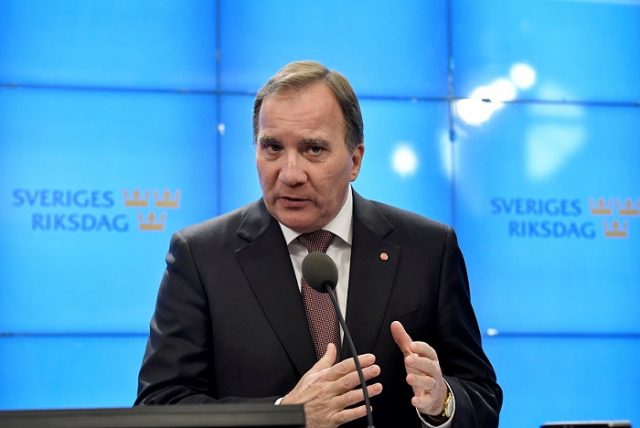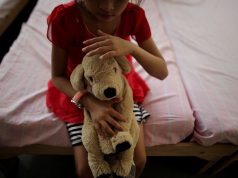
LONDON — Among the tens of thousands of child refugees who have fled to Sweden from war-torn countries is a group of young girls who have presented the Nordic country with a major dilemma – they are married.
The predicament is this. Should the country accept such unions even though they would be illegal under Swedish law and could expose girls to lifelong abuse? Or should it separate couples, potentially compounding their trauma and isolation?
It is a conundrum that has also vexed Germany, Denmark and the Netherlands, which have re-examined their laws and policies since the European refugee crisis began in 2015.
Sweden bans marriage under 18. But foreign underage marriages are recognized if legal in the countries where they were carried out.
That is set to change. Under a law, expected to come into force in January, Sweden will invalidate all underage marriages.
If the couple want to stay together they will have to remarry when both reach 18.
Rights activists are delighted.
“We hear about these cases all the time,” said Sara Mohammad, founder of GAPF, an organisation which campaigns against “honour” related abuse, including child marriage.
“We need to protect these girls, and we need Sweden to show the world that child marriage is not OK.”
The debate in Sweden comes as global leaders are pushing to end child marriage by 2030.
Advocacy group Girls Not Brides says 12 million girls under 18 marry each year worldwide, depriving them of education and increasing their risk of domestic and sexual violence.
Mohammad arrived in Sweden in 1993 having fled Iraq where her brother tried to shoot her with a Kalashnikov after she ran away from her own child marriage on her wedding day.
“If Sweden shows that these marriages are not allowed, most girls in forced marriages will not choose to go back to their husbands,” she told the Thomson Reuters Foundation.
“The government must show these girls that it will protect them.”
Outlawed
Sweden has been one of the most generous countries during Europe’s migrant crisis. Some 400,000 people have sought asylum there since 2012.
But there is no comprehensive data on how many married children are among the arrivals. In 2016, Sweden’s Migration Agency said it had identified 132 married children, 129 of them girls. Most came from Syria, Iraq and Afghanistan.
Mohammad said the real number was “much bigger”.
Tina Trygg, an expert on the issue at Sweden’s governmental National Board of Health and Welfare, which provides guidance to social services, said there were probably more cases as young married girls who arrive with their parents may go undetected.
Steps to tighten the law in Sweden follow similar moves in Germany, which has taken in more than 1.6 million asylum seekers, mainly from the Middle East and Africa, since 2014.
Germany reported in 2016 that nearly 1,500 foreign children living in the country were listed as “married” on their paperwork.
Last year it outlawed all marriages and engagements under the age of 18.
“Child abuse”
Swedish authorities have faced many difficulties knowing how to support married girls, with social workers complaining of a lack of guidance, according to an investigation by the National Board of Health and Welfare.
Trygg said most of the girls had children, which meant social services had to balance the welfare of the young mother, who might be better off separated from her spouse, against her children’s conflicting need to be with both parents.
One official quoted in the board’s report also highlighted the risk of subjecting a girl to further trauma if she is “taken against her will when she has just arrived in Sweden and what she thought was a safe haven”.
In many cases, Trygg said, girls asked to remain with their husbands but social workers often found it hard to assess whether the girls were really expressing their own will.
The board has produced a fact sheet on child marriage for new arrivals.
This states that sex with a child under 15 is a crime even if the child is reported to be married, that non-consensual sex – even within marriage – is rape, and that any married person can divorce even if their spouse is opposed.
But child marriage is nothing new in Sweden.
Zinat Pirzadeh, a school careers counselor in Stockholm, said Swedish girls from ethnic minority backgrounds vanished every year to be married off in their parents’ home countries.
Pirzadeh, who suffered years of violence after she was married at 16 in her native Iran, said politicians and officials were often too scared to speak out for fear of being branded racist or Islamaphobic.
But she said turning a blind eye was itself racist because it meant children were not being equally protected regardless of their background.
“It’s so wrong that we even use the term ‘child marriage’,” she added. “Children get raped in that kind of marriage. It’s child abuse.”
Pirzadeh believes the new law is crucial.
“A child should be a child. A child has to have a chance to grow up,” she said. “I know from my heart how hard it is to be with some guy you don’t know, don’t love, don’t want to share a roof with. I wouldn’t wish it on my worst enemy.” —Reporting by Emma Batha @emmabatha; Editing by Katy Migiro









